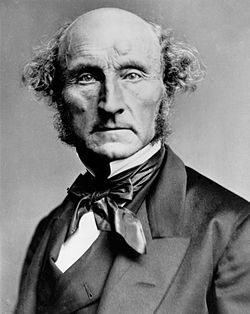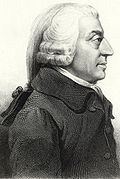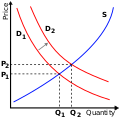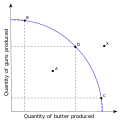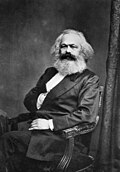Portal:Economics
Portal maintenance status: (December 2018)
|
Introduction
Economics (/ˌɛkəˈnɒmɪks, ˌiːkə-/) is a behavioral science that studies the production, distribution, and consumption of goods and services.
Economics focuses on the behaviour and interactions of economic agents and how economies work. Microeconomics analyses what is viewed as basic elements within economies, including individual agents and markets, their interactions, and the outcomes of interactions. Individual agents may include, for example, households, firms, buyers, and sellers. Macroeconomics analyses economies as systems where production, distribution, consumption, savings, and investment expenditure interact; and the factors of production affecting them, such as: labour, capital, land, and enterprise, inflation, economic growth, and public policies that impact these elements. It also seeks to analyse and describe the global economy. (Full article...)
Selected general articles
-
Image 1Evolutionary economics is a school of economic thought that is inspired by evolutionary biology. Although not defined by a strict set of principles and uniting various approaches, it treats economic development as a process rather than an equilibrium and emphasizes change (qualitative, organisational, and structural), innovation, complex interdependencies, self-evolving systems, and limited rationality as the drivers of economic evolution. The support for the evolutionary approach to economics in recent decades seems to have initially emerged as a criticism of the mainstream neoclassical economics, but by the beginning of the 21st century it had become part of the economic mainstream itself.
Evolutionary economics does not take the characteristics of either the objects of choice or of the decision-maker as fixed. Rather, it focuses on the non-equilibrium processes that transform the economy from within and their implications, considering interdependencies and feedback. The processes in turn emerge from the actions of diverse agents with bounded rationality who may learn from experience and interactions and whose differences contribute to the change. (Full article...) -
Image 2Complexity economics, or economic complexity, is the application of complexity science to the problems of economics. It relaxes several common assumptions in economics, including general equilibrium theory. While it does not reject the existence of an equilibrium, it features a non-equilibrium approach and sees such equilibria as a special case and as an emergent property resulting from complex interactions between economic agents. The complexity science approach has also been applied to computational economics. (Full article...)
-
Image 3
Robert Emerson Lucas Jr. (September 15, 1937 – May 15, 2023) was an American economist at the University of Chicago. Widely regarded as the central figure in the development of the new classical approach to macroeconomics, he received the Nobel Memorial Prize in Economic Sciences in 1995 "for having developed and applied the hypothesis of rational expectations, and thereby having transformed macroeconomic analysis and deepened our understanding of economic policy". N. Gregory Mankiw characterized him as "the most influential macroeconomist of the last quarter of the 20th century". In 2020, he ranked as the 10th most cited economist in the world. (Full article...) -
Image 4Marginalism is a theory of economics that attempts to explain the discrepancy in the value of goods and services by reference to their secondary, or marginal, utility. It states that the reason why the price of diamonds is higher than that of water, for example, owes to the greater additional satisfaction of the diamonds over the water. Thus, while the water has greater total utility, the diamond has greater marginal utility.
Although the central concept of marginalism is that of marginal utility, marginalists, following the lead of Alfred Marshall, drew upon the idea of marginal physical productivity in explanation of cost. The neoclassical tradition that emerged from British marginalism abandoned the concept of utility and gave marginal rates of substitution a more fundamental role in analysis. Marginalism is an integral part of mainstream economic theory. (Full article...) -
Image 5Pierre Samuel du Pont de Nemours, a prominent physiocrat. In his book La Physiocratie, du Pont advocated low tariffs and free trade.
Physiocracy (French: physiocratie; from the Greek for "government of nature") is an economic theory developed by a group of 18th-century Age of Enlightenment French economists. They believed that the wealth of nations derived solely from the value of "land agriculture" or "land development" and that agricultural products should be highly priced. Their theories originated in France and were most popular during the second half of the 18th century. Physiocracy became one of the first well-developed theories of economics.
François Quesnay (1694–1774), the marquis de Mirabeau (1715–1789) and Anne-Robert-Jacques Turgot (1727–1781) dominated the movement, which immediately preceded the first modern school, classical economics, which began with the publication of Adam Smith's The Wealth of Nations in 1776. (Full article...) -
Image 6Socialist economics comprises the economic theories, practices and norms of hypothetical and existing socialist economic systems. A socialist economic system is characterized by social ownership and operation of the means of production that may take the form of autonomous cooperatives or direct public ownership wherein production is carried out directly for use rather than for profit. Socialist systems that utilize markets for allocating capital goods and factors of production among economic units are designated market socialism. When planning is utilized, the economic system is designated as a socialist planned economy. Non-market forms of socialism usually include a system of accounting based on calculation-in-kind to value resources and goods.
Socialist economics has been associated with different schools of economic thought. Marxian economics provided a foundation for socialism based on analysis of capitalism while neoclassical economics and evolutionary economics provided comprehensive models of socialism. During the 20th century, proposals and models for both socialist planned and market economies were based heavily on neoclassical economics or a synthesis of neoclassical economics with Marxian or institutional economics. (Full article...) -
Image 7

The first issue of Ms. examined feminist economics in a piece by Jane O'Reilly
Feminist economics is the critical study of economics and economies, with a focus on gender-aware and inclusive economic inquiry and policy analysis. Feminist economic researchers include academics, activists, policy theorists, and practitioners. Much feminist economic research focuses on topics that have been neglected in the field, such as care work, intimate partner violence, or on economic theories which could be improved through better incorporation of gendered effects and interactions, such as between paid and unpaid sectors of economies. Other feminist scholars have engaged in new forms of data collection and measurement such as the Gender Empowerment Measure (GEM), and more gender-aware theories such as the capabilities approach. Feminist economics is oriented toward the social ecology of money.
Feminist economists call attention to the social constructions of traditional economics, questioning the extent to which it is positive and objective, and showing how its models and methods are biased by an exclusive attention to masculine-associated topics and a one-sided favoring of masculine-associated assumptions and methods. While economics traditionally focused on markets and masculine-associated ideas of autonomy, abstraction and logic, feminist economists call for a fuller exploration of economic life, including such "culturally feminine" topics such as family economics, and examining the importance of connections, concreteness, and emotion in explaining economic phenomena. (Full article...) -
Image 8Mutualism is an anarchist school of thought and economic theory that advocates for workers' control of the means of production, a free market made up of individual artisans, sole proprietorships and workers' cooperatives, and occupation and use property rights. As proponents of the labour theory of value and labour theory of property, mutualists oppose all forms of economic rent, profit and non-nominal interest, which they see as relying on the exploitation of labour. Mutualists seek to construct an economy without capital accumulation or concentration of land ownership. They also encourage the establishment of workers' self-management, which they propose could be supported through the issuance of mutual credit by mutual banks, with the aim of creating a federal society.
Mutualism has its roots in the utopian socialism of Robert Owen and Charles Fourier. It first developed a practical expression in Josiah Warren's community experiments in the United States, which he established according to the principles of equitable commerce based on a system of labor notes. Mutualism was first formulated into a comprehensive economic theory by the French anarchist Pierre-Joseph Proudhon, who proposed the abolition of unequal exchange and the establishment of a new economic system based on reciprocity. In order to establish such a system, he proposed the creation of a "People's Bank" that could issue mutual credit to workers and eventually replace the state; although his own attempts to establish such a system were foiled by the 1851 French coup d'état. (Full article...) -
Image 9
Richard H. Thaler (/ˈθeɪlər/; born September 12, 1945) is an American economist and the Charles R. Walgreen Distinguished Service Professor of Behavioral Science and Economics at the University of Chicago Booth School of Business. In 2015, Thaler was president of the American Economic Association.
Thaler is a theorist in behavioral economics. He has collaborated with Daniel Kahneman, Amos Tversky, and others in further defining that field. In 2018, he was elected a member in the National Academy of Sciences. (Full article...) -
Image 10
François Quesnay (/keɪˈneɪ/; French: [fʁɑ̃swa kɛnɛ]; 4 June 1694 – 16 December 1774) was a French economist and physician of the Physiocratic school. He is known for publishing the "Tableau économique" (Economic Table) in 1758, which provided the foundations of the ideas of the Physiocrats. This was perhaps the first work attempting to describe the workings of the economy in an analytical way, and as such can be viewed as one of the first important contributions to economic thought. His Le Despotisme de la Chine, written in 1767, describes Chinese politics and society, and his own political support for enlightened despotism. (Full article...) -
Image 11
Kenneth Joseph Arrow (August 23, 1921 – February 21, 2017) was an American economist, mathematician and political theorist. He received the John Bates Clark Medal in 1957, and the Nobel Memorial Prize in Economic Sciences in 1972, along with John Hicks.
In economics, Arrow was a major figure in postwar neoclassical economic theory. Four of his students (Roger Myerson, Eric Maskin, John Harsanyi, and Michael Spence) went on to become Nobel laureates themselves. His contributions to social choice theory, notably his "impossibility theorem", and his work on general equilibrium analysis are significant. His work in many other areas of economics, including endogenous growth theory and the economics of information, was also foundational. (Full article...) -
Image 12
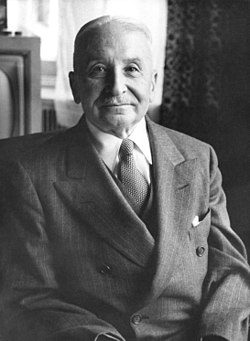
Ludwig Heinrich Edler von Mises (/vɒn ˈmiːzɪz/; German: [ˈluːtvɪç fɔn ˈmiːzəs]; September 29, 1881 – October 10, 1973) was an Austrian-American political economist and philosopher of the Austrian school. Mises wrote and lectured extensively on the social contributions of classical liberalism and the central role of consumers in a market economy. He is best known for his work in praxeology, particularly for studies comparing communism and capitalism, as well as for being a defender of classical liberalism in the face of rising illiberalism and authoritarianism throughout much of Europe during the 20th century.
In 1940, Mises emigrated from Austria to the United States to escape the Nazis. On the day German forces entered Vienna, they raided his apartment, confiscating his papers and library, which were believed lost or destroyed until rediscovered decades later in Soviet archives. At the time, Mises was living in Geneva, Switzerland. However, with the imminent Nazi occupation of France threatening to isolate Switzerland within Axis-controlled territory, he and his wife fled through France—avoiding German patrols—and reached the United States via Spain and Portugal. (Full article...) -
Image 13

Claude-Frédéric Bastiat (/bɑːstiˈɑː/; French: [klod fʁedeʁik bastja]; 30 June 1801 – 24 December 1850) was a French economist, writer and a prominent member of the French liberal school.
A member of the French National Assembly, Bastiat developed the economic concept of opportunity cost and introduced the parable of the broken window. He was described as "the most brilliant economic journalist who ever lived" by economic theorist Joseph Schumpeter. (Full article...) -
Image 14In the history of economic thought, a school of economic thought is a group of economic thinkers who share or shared a mutual perspective on the way economies function. While economists do not always fit within particular schools, particularly in the modern era, classifying economists into schools of thought is common. Economic thought may be roughly divided into three phases: premodern (Greco-Roman, Indian, Persian, Islamic, and Imperial Chinese), early modern (mercantilist, physiocrats) and modern (beginning with Adam Smith and classical economics in the late 18th century, and Karl Marx and Friedrich Engels' Marxian economics in the mid 19th century). Systematic economic theory has been developed primarily since the beginning of what is termed the modern era.
Currently, the great majority of economists follow an approach referred to as mainstream economics (sometimes called 'orthodox economics'). Economists generally specialize into either macroeconomics, broadly on the general scope of the economy as a whole, and microeconomics, on specific markets or actors. (Full article...) -
Image 15
Carl Menger von Wolfensgrün (/ˈmɛŋɡər/; German: [ˈmɛŋɐ]; 28 February 1840 – 26 February 1921) was an Austrian economist who contributed to the marginal theory of value. Menger is considered the founder of the Austrian school of economics.
In building his marginalist approach, Menger rejected many established views of classical economics. He directly disputed the view of the "German school" that economic theory could be derived from history. Departing from the cost-of-production theory of value—the prevailing theory of Adam Smith, David Ricardo, and Karl Marx—Menger's subjective theory of value emphasized role of mutual agreement in deriving prices. Although he had few readers outside Vienna until late in his career, disciples including Eugen von Böhm-Bawerk and Friedrich von Wieser brought his theories into wider readership. Friedrich Hayek wrote that the Austrian school's "fundamental ideas belong fully and wholly to Carl Menger." (Full article...) -
Image 16The pluralism in economics movement is a campaign to change the teaching and research in economics towards more openness in its approaches, topics and standpoints it considers. The goal of the movement is to "reinvigorate the discipline ... [and bring] economics back into the service of society". Some have argued that economics had greater scientific pluralism in the past compared to the monist approach that is prevalent today. Pluralism encourages the inclusion of a wide variety of neoclassical and heterodox economic theories—including classical, Post-Keynesian, institutional, ecological, evolutionary, feminist, Marxist, and Austrian economics, stating that "each tradition of thought adds something unique and valuable to economic scholarship". (Full article...)
-
Image 17This glossary of economics is a list of definitions containing terms and concepts used in economics, its sub-disciplines, and related fields. (Full article...)
-
Image 18
John Stuart Mill (20 May 1806 – 7 May 1873) was an English philosopher, political economist, politician and civil servant. One of the most influential thinkers in the history of liberalism and social liberalism, he contributed widely to social theory, political theory, and political economy. Dubbed "the most influential English-speaking philosopher of the nineteenth century" by the Stanford Encyclopedia of Philosophy, he conceived of liberty as justifying the freedom of the individual in opposition to unlimited state and social control. He advocated political and social reforms such as proportional representation, the emancipation of women, and the development of labour organisations and farm cooperatives.
The Columbia Encyclopedia describes Mill as occasionally coming "close to socialism, a theory repugnant to his predecessors". He was a proponent of utilitarianism, an ethical theory developed by his predecessor Jeremy Bentham. He contributed to the investigation of scientific methodology, though his knowledge of the topic was based on the writings of others, notably William Whewell, John Herschel, and Auguste Comte, and research carried out for Mill by Alexander Bain. He engaged in written debate with Whewell. A member of the Liberal Party and author of the early feminist work The Subjection of Women, Mill was also the second Member of Parliament to call for women's suffrage after Henry Hunt in 1832. (Full article...) -
Image 19
Hans-Hermann Hoppe (/ˈhɒpə/; German: [ˈhɔpə]; born 2 September 1949) is a German-American academic associated with Austrian School economics, anarcho-capitalism, right-wing libertarianism, and opposition to democracy. He is professor emeritus of economics at the University of Nevada, Las Vegas (UNLV), senior fellow of the Mises Institute think tank, and the founder and president of the Property and Freedom Society.
Hoppe has written extensively in opposition to democracy, notably in his 2001 book Democracy: The God That Failed. The book favors exclusionary "covenant communities" that are "founded for the purpose of protecting family and kin". A section of the book favoring exclusion of democrats and homosexuals from society helped popularize Hoppe on the far-right. (Full article...) -
Image 20
Paul Anthony Samuelson (May 15, 1915 – December 13, 2009) was an American economist who was the first American to win the Nobel Memorial Prize in Economic Sciences. When awarding the prize in 1970, the Swedish Royal Academies stated that he "has done more than any other contemporary economist to raise the level of scientific analysis in economic theory".
Samuelson was one of the most influential economists of the latter half of the 20th century. In 1996, he was awarded the National Medal of Science. Samuelson considered mathematics to be the "natural language" for economists and contributed significantly to the mathematical foundations of economics with his book Foundations of Economic Analysis. He was author of the best-selling economics textbook of all time: Economics: An Introductory Analysis, first published in 1948. It was the second American textbook that attempted to explain the principles of Keynesian economics. (Full article...) -
Image 21
Joseph Alois Schumpeter (German: [ˈʃʊmpeːtɐ]; February 8, 1883 – January 8, 1950) was an Austrian political economist. He served briefly as Finance Minister of Austria in 1919. In 1932, he emigrated to the United States to become a professor at Harvard University, where he remained until the end of his career, and in 1939 obtained American citizenship.
Schumpeter was one of the most influential economists of the early 20th century, and popularized creative destruction, a term coined by Werner Sombart. His magnum opus is considered Capitalism, Socialism and Democracy. (Full article...) -
Image 22
Elinor Claire "Lin" Ostrom (née Awan; August 7, 1933 – June 12, 2012) was an American political scientist and political economist whose work was associated with New Institutional Economics and the resurgence of political economy. In 2009, she was awarded the Nobel Memorial Prize in Economic Sciences for her "analysis of economic governance, especially the commons", which she shared with Oliver E. Williamson; she was the first woman to win the prize.
Trained in political science at UCLA, Ostrom was a faculty member at Indiana University Bloomington for 47 years. Beginning in the 1960s, Ostrom was involved in resource management policy and created a research center, the Workshop in Political Theory and Policy Analysis, which attracted scientists from different disciplines from around the world. Working and teaching at her center was created on the principle of a workshop, rather than a university with lectures and a strict hierarchy. Late in her career, she held an affiliation with Arizona State University. (Full article...) -
Image 23Behavioral economics is the study of the psychological (e.g. cognitive, behavioral, affective, social) factors involved in the decisions of individuals or institutions, and how these decisions deviate from those implied by traditional economic theory.
Behavioral economics is primarily concerned with the bounds of rationality of economic agents. Behavioral models typically integrate insights from psychology, neuroscience and microeconomic theory. (Full article...) -
Image 24Portrait by Thomas Phillips, c. 1821
David Ricardo (18 April 1772 – 11 September 1823) was a British political economist, politician, and member of Parliament. He is recognized as one of the most influential classical economists, alongside figures such as Thomas Malthus, Adam Smith and James Mill.
Ricardo was born in London as the third surviving child of a successful stockbroker and his wife. He came from a Sephardic Jewish family of Portuguese origin. At 21, he eloped with a Quaker and converted to Unitarianism, causing estrangement from his family. He made his fortune financing government borrowing and later retired to an estate in Gloucestershire. Ricardo served as High Sheriff of Gloucestershire and bought a seat in Parliament as an earnest reformer. He was friends with prominent figures like James Mill, Jeremy Bentham, and Thomas Malthus, engaging in debates over various topics. Ricardo was also a member of The Geological Society, and his youngest sister was an author. (Full article...) -
Image 25Modern monetary theory or modern money theory (MMT) is a heterodox macroeconomic theory that describes currency as a public monopoly and unemployment as evidence that a currency monopolist is overly restricting the supply of the financial assets needed to pay taxes and satisfy savings desires. According to MMT, governments do not need to worry about accumulating debt since they can pay interest by printing money. MMT argues that the primary risk once the economy reaches full employment is inflation, which acts as the only constraint on spending. MMT also argues that inflation can be controlled by increasing taxes on everyone, to reduce the spending capacity of the private sector.[verification needed]
MMT is opposed to the mainstream understanding of macroeconomic theory and has been criticized heavily by many mainstream economists. MMT is also strongly opposed by members of the Austrian school of economics. (Full article...)
Did you know...
- ... that in the essay "Toward European Unity" George Orwell presumed that one of the greatest obstacles to a federal Europe would be economic pressure by the United States?
- ... that soprano Galina Pisarenko studied economics, English, and Norwegian at the same time she was studying to become a professional opera singer?
- ... that Ruth Huenemann was one of the first researchers to make a connection between socioeconomic status and childhood obesity?
- ... that a banker was named the prime minister of Equatorial Guinea after his predecessor resigned during an economic crisis?
- ... that environmental economist V. Kerry Smith has been described as a "Renaissance Man of Economics"?
- ... that the 1983 Spanish floods were the most economically damaging in Spain until the 2024 Spanish floods?
Need help?
Do you have a question about Economics that you can't find the answer to?
Consider asking it at the Wikipedia reference desk.
Get involved
For editor resources and to collaborate with other editors on improving Wikipedia's Economics-related articles, see WikiProject Economics.
Selected images
-
Image 2São Paulo Stock Exchange in Brazil, an electronic trading network that brings together buyers and sellers through an electronic trading platform
-
Image 3The publication of Adam Smith's The Wealth of Nations in 1776 is considered to be the first formalisation of economic thought.
-
Image 4Pollution can be a simple example of market failure; if costs of production are not borne by producers but are by the environment, accident victims or others, then prices are distorted.
-
Image 6A 1638 painting of a French seaport during the heyday of mercantilism
-
Image 7Economists study trade, production, and consumption decisions, including those that occur in a traditional marketplace
-
Image 9The supply and demand model describes how prices vary as a result of a balance between product availability and demand. The graph depicts an increase in demand from D1 to D2 and the resulting increase in price and quantity required to reach a new equilibrium point on the supply curve (S).
-
Image 12The Marxist critique of political economy comes from the work of German philosopher Karl Marx.
-
Image 14An environmental scientist sampling water
Subcategories
Subtopics
Associated Wikimedia
The following Wikimedia Foundation sister projects provide more on this subject:
-
Commons
Free media repository -
Wikibooks
Free textbooks and manuals -
Wikidata
Free knowledge base -
Wikinews
Free-content news -
Wikiquote
Collection of quotations -
Wikisource
Free-content library -
Wikiversity
Free learning tools -
Wiktionary
Dictionary and thesaurus











